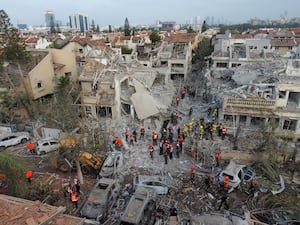Iran said on Saturday it has not yet decided whether to take part in Sunday’s latest round of talks with the US, leaving the door open to participation despite the recent Israeli military escalation.
“It is still unclear what decision we will make,” Esmaeil Baghaei, the representative for Iran’s Ministry of Foreign Affairs told state-run media.
Hours later, Foreign Minister Abbas Araghchi told the EU Foreign Policy Chief Kaya Kallas that he believes Israel's actions were the result of Washington's support and that continuing nuclear talks is "unjustifiable".
The US hopes that talks with Tehran about its nuclear programme will continue, despite Israel's attacks on Iran that have called the merit of negotiations into question.
Following Friday's strikes, Iran said it was withdrawing from the sixth round of nuclear negotiations that were to take place in Oman on Sunday with US special envoy to the Middle East envoy Steve Witkoff.
But Mr Baghaei suggested that his government is still open to participating, despite saying that Israel’s actions “effectively rendered talks meaningless”.
The talks were supposed to forestall military action against Iran by forcing it to give up all uranium enrichment capabilities and abandon its drive to develop a nuclear weapon. For weeks, US President Donald Trump sounded optimistic that a deal could be achieved, while also threatening dire consequences for Iran if it did not reach an agreement.
Ultimately, Israel rendered those talks moot by launching a “pre-emptive” strike against Iran's military leaders and its nuclear sites. Despite those actions, Mr Trump insisted Iran possibly has a “second chance” to come to the negotiating table.
Difficult position
Mr Baghaei accused the US of being somewhat responsible for the attacks that killed several high-ranking Iranian military officials and dozens of civilians.
“It is inconceivable for Iran – and indeed for anyone in the world – that the Zionist regime could have carried out such a reckless and aggressive act of war in the region without the co-operation, co-ordination, or at the very least the conscious green light of the US.
“We hold the US government responsible for the consequences of this reckless and unlawful act by the Zionist regime,” he added.
Iran finds itself in a difficult position: walking away from the talks would suggest Israel has proven Tehran is not serious about a nuclear deal, while attending could make it appear weak after the Israeli assault.
The UN nuclear watchdog's 35-nation board of governors passed a resolution on June 12 formally declaring Iran in breach of its non-proliferation obligations for the first time in almost 20 years, a move Tehran claimed was “clearly designed to produce a crisis”. Tehran also said it would open a new uranium enrichment site.
Hours later, Israel launched strikes on Iran, prompting Tehran to retaliate by firing dozens of missiles towards Israel, killing at least three people and injuring more than 150.


